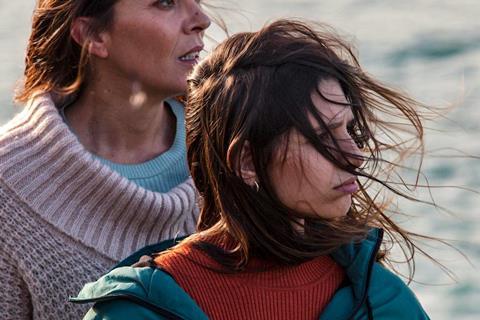A young girl searches for her missing father in this impressive debut set on the stormy Galician coast

Dir/scr: Carla Subirana. Spain. 2022. 87mins
A melancholy, stormy film about a teenager’s melancholy, stormy relationship with the ocean that claimed her father, Carla Subirana’s Galician-language first feature Sica is many things at once: a coming-of-age tale, a critique of a declining fishing industry and climate change, a regional thriller, and more. These disparate threads are pulled into line by potent atmospherics and the overarching aura of tragedy and, even though it has its flaws, the range and ambition of Sica make for a memorable viewing experience – one that is elemental in the best and truest sense of the word. Following berths in Berlin and Malaga, further festival interest is on the cards for an environmentally-centred film that also represents the latest addition to the burgeoning stable of Galician cinema.
An elemental viewing experience
Sica is set on the Costa da Morte (Death Coast) in north-western Spain, home to innumerable shipwrecks and a fishing industry whose traditional ways are gradually being impoverished out of existence. We first see Sica (non-professional actor Thais Garcia Blanco) on a windswept beach, angry as the search for her father is abandoned by the authorities.
Knowing that his body is likely to be washed up, Sica (abbreviated from the Greek ’Nausicaa’, from Homer’s Odyssey) decides to search for him until that happens. Not knowing where else to turn, and seeking guidance in myth and nature, she heads to a crack in the rocks where it’s thought that the souls of dead sailors speak to the living. Shots of the bereaved girl wandering the coastline cliffs, tiny against the majestic background, recur throughout, but feel right and are never just indulgent movie tourism.
Unsmiling and gawky as she roams around in her wellies – her nickname is ‘Roadrunner’ – Sica is an outsider, and the object of constant ridicule from her schoolmates, including her friend Leda (Maria Villaverde Ameijeiras). It quickly becomes clear from the attitude of Sica’s mother Carmen (Nuria Prims) that there’s something fishy, so to speak, about her father’s death. After half an hour, a body is indeed washed up on the shore, but questions are quickly raised in the community about whether it belongs to Sica or to Leda’s father (DNA testing is not raised, but may not be commonplace in this particular area).
This thrillerish plotline is compelling and, though it feels rushed, will play out devastatingly for Sica. Subirana’s directorial concerns are elsewhere, however, and largely environmental – as over-signalled during a school class about the decreasing temperature of the sun. Whether it’s in the sweeping landscapes or focusing on the details of squid and crabs, this is ultimately a homage to the power of nature, and about Sica’s inner journey from seeing the sea as her enemy to embracing it.
Sica falls in with Suso (Marco Antonio Florido Anon, another non-professional), another oddball teen known locally as ’Stormchaser’, who has an uncanny understanding of the natural world. Suso predicts the arrival of a massive storm: a terrific, breathless scene in which Sica and Suso stand on the cliffside, shouting at a rain cloud, has a primal, epic charge about it, as the two teenagers learn that the force of nature can actually bring them closer together as people. Only over the last half-hour, with the introduction of a grizzled, cliched and dramatically unnecessary figure called ’El Portugues’ (Lois Soaxe) do things start to unravel somewhat – but it does take us to a final scene that is, against all the odds, redemptive and optimistic.
Subirana’s previous work is in documentaries, and she brings a suitably forensic approach to the way that place influences character. “We are nothing compared to the sea,” someone murmurs at the wake, and setting is everything in Sica. The rolling swells of the dangerous Atlantic battering the shoreline under constant rain are beautifully rendered by the camerawork of Anna Molins and Mauro Herce, who has in the past worked with Olivier Laxe. Xavi Font’s unearthly, ethereal score seems to appropriately echo the sounds of sirens, whale song and foghorns, adding a further layer to the melancholy tone.
The Costa da Muerte is indeed a dangerous place to eke out a living, and one scene shows us the locals strapping themselves together to go and fetch barnacles from the rocks. Likewise, the village where the action unfolds is presented as sealed-off, full of suspicion and wariness, financially precarious and beyond the reach of the law. All of which plays out in the characters’ private lives, and the strength and solidity of Subirana’s script elegantly traces these intertwining threads.
Production companies: Alba Sotorra, Miramemira, Zuzu Cinema, Amorambre Films, Sica
International sales: Latido Films juan@latidofilms.com
Producers: Alba Sotorra, Andrea Vazquez, Xavi Font
Cinematography: Mauro Herce, Anna Molins
Production design: Anna Chwaliszewska
Editing: Juliana Montanes
Music: Xavi Font
Main cast: Thais Garcia Blanco, Nuria Prims, Marco Antonio Florido Anon, Maria Villaverde Ameijeiras, Lois Soaxe
























![The Brightest SunScreen[Courtesy HKIFF]](https://d1nslcd7m2225b.cloudfront.net/Pictures/100x67/3/5/0/1448350_thebrightestsunscreencourtesyhkiff_312678.jpg)









